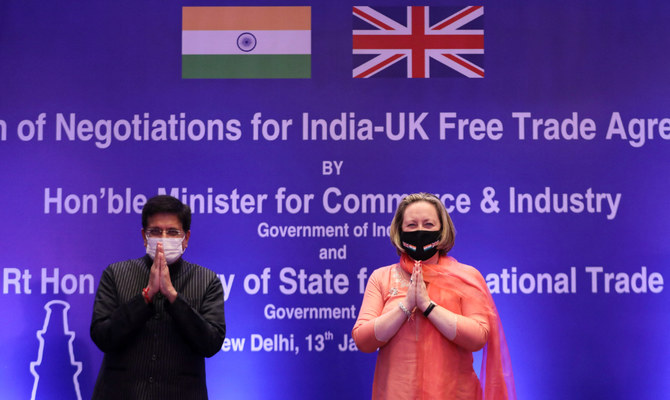NEW DELHI: India and the United Kingdom on Thursday formally launched talks for a free-trade deal expected to double their bilateral trade by 2030.
The UK has made the agreement with India one of its post-Brexit priorities, with London aiming to anchor its trade policy toward the fast-growing economies in the Indo-Pacific region.
India’s Trade and Commerce Minister Piyush Goyal started the talks with Britain’s International Trade Secretary Anne-Marie Trevelyan, who arrived in New Delhi on Wednesday.
Actual negotiations are scheduled to begin next week.
“The FTA with the UK is expected to provide certainty, predictability and transparency and will create a more liberal, facilitative and competitive services regime,” Goyal said in a joint press conference with Trevelyan.
“The negotiations with the UK are expected to increase our exports in leather, textile, jewelry and processed agriproducts, and register a quantum jump in the export of marine products.”
Trevelyan said the deal, under which the countries would double bilateral trade by 2030, would help strengthen their post-pandemic recovery.
“With the commencement of the first full round of talks this month, the trade deal between the United Kingdom and India will put us in pole position to recover from the pandemic and to strengthen our mutually beneficial ties and to grasp the enormous opportunities that lie ahead,” she said.
“We aim to double trade between our countries by the end of this decade supporting jobs, businesses and communities in both countries.”
The British Embassy in New Delhi said in a statement the agreement would boost two-way trade by $38.4 billion a year by 2035.
Foreign policy expert Harsh V. Pant of the New Delhi-based Observer Research Foundation told Arab News the deal would give “new momentum” to India’s trade relations with the UK, with both countries seeking to reposition themselves for a post-pandemic world order.
“This is important for both sides, as Britain looks to diversify and it looks to engage with the post-Brexit economic order, and India looks at a post-COVID global economic environment,” he said.
“There is a recognition that at the time of global economic fragmentation and the supply chain restructuring, India has to get its economic act in order.”
He added that for India, signing free-trade agreements would be important in its goal to be a part of the “global economic map,” while for the UK, the Indo-Pacific push was part of its post-Brexit economic.
“India, with such a big market, is one of the largest economies of the world. It is in Britain’s interests to see that this this deal is signed,” Pant said.
“Even with limited tariff reduction, it will lead to a significant increase in trade volumes.”

